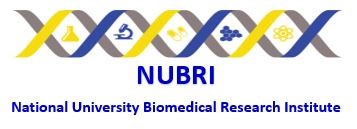Master of Bioinformatics
The bioinformatics master’s degree program was established in 2019 and is offered over 12 months. It incorporates 13 coursework modules and a research project running concurrently throughout the program. The first batch has graduated with a total number of 28 students, the second batch (25 students) are on their last semester and batch three is one their registration process.
This master’s degree program equips the students with the following:
- A basic background in modern biology, biochemistry, cell biology, genetics, and molecular biology;
- Familiarity with computational methods to address problems of digital technology in molecular biology;
- Knowledge on storage, retrieval, sharing, and use of biological information in core areas of bioinformatics: multiple sequence alignment, phylogenetic trees, genomics, and proteomics; and
- Skills in applied bioinformatics: immunoinformatics, drug designing, and discovery.
The program’s courses cover introductory programming and molecular biology before moving on to more advanced topics. The program is evenly divided into coursework and research. The coursework includes diverse modules covering mathematics, statistics, computer science, and biology, with an emphasis on applications to bioinformatics research. The institute actively recruits students from different backgrounds with the belief that diversity positively impacts student interactions and overall academic experience. For purposes of knowledge transfer and promoting collaborations, international experts are invited to provide workshops at the institute in order to keep students updated with all the most recent bioinformatics tools and software used in big data analysis.
Upon successful completion of the master’s program, students should be able to (a) outline strategies and apply appropriate tools in bioinformatics; (b) identify potential bioinformatics applications drawn from ongoing research; (c) interpret data related to sequences of nucleotides and amino acids, protein domains, and protein structures; (d) develop and implement tools that enable efficient access and management of data; (e) acquire essential programming skills; and (f) demonstrate an understanding of the algorithms used in bioinformatics.
Avail:
- Apt Bioinformatics knowledge for interpretation of the rapidly expanding biological information.
- Basic concepts of bioinformatics to identify, seek, establish, maintain and exchange research information in biology.
Equip the students with:
- Requisite background in modern biology, Biochemistry, Cell biology, Genetics and Molecular Biology.
- Familiarity in computational methods to address problems in molecular biology.
- Knowledge on storage, retrieval, sharing and use of biological information in core areas of Bioinformatics: multiple sequence alignment, Phylogenetic trees, Genomics, Proteomics etc.
- Skills in applied Bioinformatics: Immunoinformatics, Drug designing and discovery.
Upon successful completion of the program, the successful candidates should be able to:
- Identity strategies and apply appropriate tools in Bioinformatics.
- Identify topical problems drawn from ongoing research and their applications
- Interpret data related to sequences of nucleotides and amino acids,
- Protein domains and protein structures.
- Develop and implement tools that enable efficient access and management of data.
- Acquire the essential programming skills.
- Demonstrate an understanding of the algorithms used in Bioinformatics
Admission requires:
Applicants must satisfy the general regulations set by the collage of graduate studies and scientific research of the National University –Sudan for registration for master degrees. Hold honors B.Sc. from recognized University in: Science, Biotechnology, Agriculture, Medicine, Veterinary Science, Pharmacy, Medical Laboratory sciences and Dentistry.
Career Opportunities:
The MSc programme in Bioinformatics qualifies student to become professionals within area such as:
- A PhD programme.
- Research Institutions, public and private and in universities.
